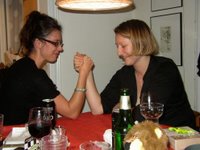God Jul
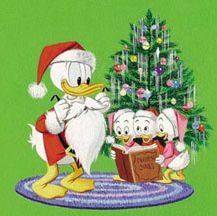 It’s tradition in both
It’s tradition in both I’m off to
Merry Christmas and Happy New Year!
God Jul och Gott Nytt År!
 It’s tradition in both
It’s tradition in both I’m off to
Merry Christmas and Happy New Year!
God Jul och Gott Nytt År!
 Tomorrow is the shortest day of the year - with 6 hours, 3 minutes, and 40 seconds of daylight. Sunrise is at 8:45am and sunset is at 2:48pm.
Tomorrow is the shortest day of the year - with 6 hours, 3 minutes, and 40 seconds of daylight. Sunrise is at 8:45am and sunset is at 2:48pm.The darkness really doesn't bother me that much during the week. However, it messes me up on the weekends, especially on Sundays. I have been going into
I got a DVD player (for Christmas) last weekend (country code specificity on laptops is lame!) and the movie rental store 10 min away is open until
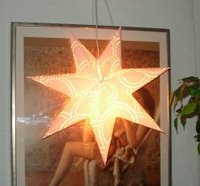 Both Friday and Saturday nights I was at "spontaneous" parties and dinners with people from my department. Carolina and Henrick had invited a few people to their place for dinner after work, before going out Friday night. However, the invite got spread to more like a few dozen people. So, we picked up some party supplies on our way over to their apartment - and we ended up partying there, rather than going out. Fairly late on Friday night, Kathy told those of us that were left at the party that she wanted to cook dinner for all of us on Saturday. Line and Leif offered their house for the dinner. Although Kathy didn't remember her dinner plan, she, along with Line and Leif, made the dinner party happen.
Both Friday and Saturday nights I was at "spontaneous" parties and dinners with people from my department. Carolina and Henrick had invited a few people to their place for dinner after work, before going out Friday night. However, the invite got spread to more like a few dozen people. So, we picked up some party supplies on our way over to their apartment - and we ended up partying there, rather than going out. Fairly late on Friday night, Kathy told those of us that were left at the party that she wanted to cook dinner for all of us on Saturday. Line and Leif offered their house for the dinner. Although Kathy didn't remember her dinner plan, she, along with Line and Leif, made the dinner party happen.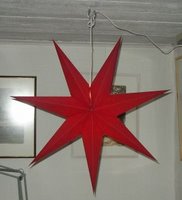 I spent most of Saturday and Sunday afternoons shopping. I exchanged my broken red star (new one in the picture - you can't tell because of the flash, but it's lit up). These stars are popular Christmas decorations in Sweden. I like them so I bought two (the other one is with the first paragraph). They brighten up my apartment. I'll probably leave them up year round (or until I get tired of them). The other common decoration in Sweden is the electric candles that I have a picture of below. Every house has at least one of these (my landlady has one) and many business and our lab have these in every window. I'm told that they are displayed during Advent. In addition to these, a lot of shops and restaurants have real candles outside, on either side of their doorway (not on the crowded city streets but those off the main roads and those around my place). I'm not sure whether all of these lights/candles are for Christmas or because of the darkness. I guess I'll see in January.
I spent most of Saturday and Sunday afternoons shopping. I exchanged my broken red star (new one in the picture - you can't tell because of the flash, but it's lit up). These stars are popular Christmas decorations in Sweden. I like them so I bought two (the other one is with the first paragraph). They brighten up my apartment. I'll probably leave them up year round (or until I get tired of them). The other common decoration in Sweden is the electric candles that I have a picture of below. Every house has at least one of these (my landlady has one) and many business and our lab have these in every window. I'm told that they are displayed during Advent. In addition to these, a lot of shops and restaurants have real candles outside, on either side of their doorway (not on the crowded city streets but those off the main roads and those around my place). I'm not sure whether all of these lights/candles are for Christmas or because of the darkness. I guess I'll see in January.
 Our department's Christmas party was on Tuesday. A different group/lab organizes the festivities every year. This year's group put a lot of work into it.
Our department's Christmas party was on Tuesday. A different group/lab organizes the festivities every year. This year's group put a lot of work into it. Today is St. Lucy's Day. I explained some of the history of this in a previous post (Typical Tuesday) so I'm not going to repeat it - especially since the story still isn't exactly clear to me.
Today is St. Lucy's Day. I explained some of the history of this in a previous post (Typical Tuesday) so I'm not going to repeat it - especially since the story still isn't exactly clear to me.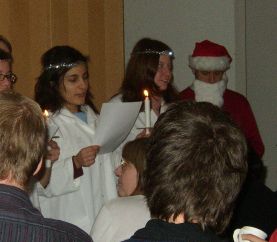 I have no idea what I'm looking at. I think I was looking for my lab because I gave them my camera. Clearly, I was totally off!
I have no idea what I'm looking at. I think I was looking for my lab because I gave them my camera. Clearly, I was totally off!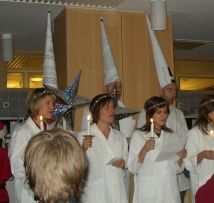 These are the starboys. Yes, their cone hats are actually meeting posters! They were hilarious because 2/3 are very tall and with the cones, they couldn't go through doorways and they kept getting stuck on the ceiling.
These are the starboys. Yes, their cone hats are actually meeting posters! They were hilarious because 2/3 are very tall and with the cones, they couldn't go through doorways and they kept getting stuck on the ceiling.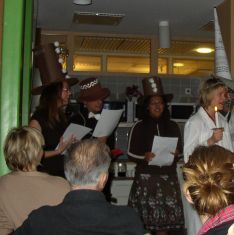 the gingerbread man and women
the gingerbread man and women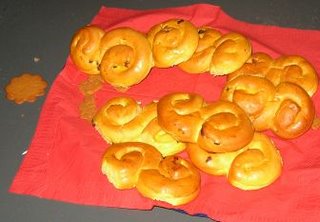 The major twist to this year's Luciatorg was that most of the torg and audience was hungover from the department Christmas party last night. This is getting long and the party last night was eventful enough for it's own post. To be continued........
The major twist to this year's Luciatorg was that most of the torg and audience was hungover from the department Christmas party last night. This is getting long and the party last night was eventful enough for it's own post. To be continued........ Today has been relatively science-free for me. However, there's been a lot of science around Stockholm today. First, the Nobel Prizes are being awarded today. I did just watch the ceremony (on TV) but, aside from the introductions, it was all in Swedish - and my Swedish isn't that good! Second, many have been following the current NASA mission very closely. I don't think Swedes normally pay much attention to NASA but that all changed recently. This morning, the spaceship Discovery included astronaut Christer Fuglesang, the first Swede to be launched into space. The picture I have above I took in front of the Culture Museum today. Every newscast I've seen over the past week or two has included something about NASA, the Discovery, and/or Fuglesang. The news media was very upset when the mission was scrapped earlier in the week. They have been building up to it for so long. However, they were able to come through today with coverage of the actual launch.
Today has been relatively science-free for me. However, there's been a lot of science around Stockholm today. First, the Nobel Prizes are being awarded today. I did just watch the ceremony (on TV) but, aside from the introductions, it was all in Swedish - and my Swedish isn't that good! Second, many have been following the current NASA mission very closely. I don't think Swedes normally pay much attention to NASA but that all changed recently. This morning, the spaceship Discovery included astronaut Christer Fuglesang, the first Swede to be launched into space. The picture I have above I took in front of the Culture Museum today. Every newscast I've seen over the past week or two has included something about NASA, the Discovery, and/or Fuglesang. The news media was very upset when the mission was scrapped earlier in the week. They have been building up to it for so long. However, they were able to come through today with coverage of the actual launch. This week is Nobel Week. Every year, the Nobel prizes are awarded on December 10th. All of the Nobel prizes, with the exception of the Nobel Peace Prize are given out in Stockholm. The Nobel prize in Physiology or Medicine is awarded by a committee at the Karolinska Institute (members of which include profs in my department). So, needless to say, this is a pretty big deal here.
This week is Nobel Week. Every year, the Nobel prizes are awarded on December 10th. All of the Nobel prizes, with the exception of the Nobel Peace Prize are given out in Stockholm. The Nobel prize in Physiology or Medicine is awarded by a committee at the Karolinska Institute (members of which include profs in my department). So, needless to say, this is a pretty big deal here.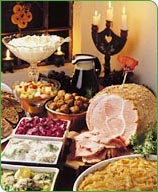 I just got back from Christmas party #2 (and yes, it's only 12/5!). Tonight was the spinal cord group's Christmas party. We went to a nice restaurant for a Swedish Julbord (literal translation = Christmas table). I'm assuming it's the Christmas version of the smorgasbord - because that's what it looked like.
I just got back from Christmas party #2 (and yes, it's only 12/5!). Tonight was the spinal cord group's Christmas party. We went to a nice restaurant for a Swedish Julbord (literal translation = Christmas table). I'm assuming it's the Christmas version of the smorgasbord - because that's what it looked like.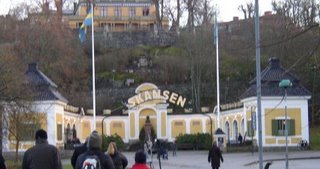 Yesterday, I went to Skansen with Maaike and Remco. Skansen is "an open air museum" (but I'd call it a restoration village?) and they had a traditional Swedish Christmas market there this weekend. I didn't buy anything at the market, just "window shopped". There were a bunch of booths selling smoked meats, cheeses, gingerbread, jams, and some crafts. We wandered through the restoration village and the Scandinavian section (elks, reindeer, etc). It got cold during the day so I didn't take any pictures there (my hands were cold and I was wearing big, bulky gloves). However, I was warmed up by a cup of coffee indoors after we were done at Skansen. Rather than take the bus, I walked from Skansen to the metro and took these pictures on my way.
Yesterday, I went to Skansen with Maaike and Remco. Skansen is "an open air museum" (but I'd call it a restoration village?) and they had a traditional Swedish Christmas market there this weekend. I didn't buy anything at the market, just "window shopped". There were a bunch of booths selling smoked meats, cheeses, gingerbread, jams, and some crafts. We wandered through the restoration village and the Scandinavian section (elks, reindeer, etc). It got cold during the day so I didn't take any pictures there (my hands were cold and I was wearing big, bulky gloves). However, I was warmed up by a cup of coffee indoors after we were done at Skansen. Rather than take the bus, I walked from Skansen to the metro and took these pictures on my way.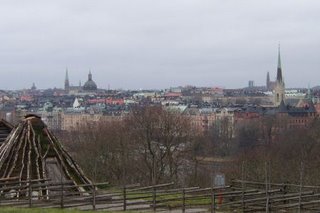 I took this from a high point at Skansen. So, no, the hut isn't a typical Swedish apartment.
I took this from a high point at Skansen. So, no, the hut isn't a typical Swedish apartment.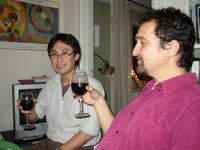 Throughout the meal, it is Swedish tradition for everyone to have a snaps glass filled in front of them at all times. A snaps glass looks like a combination of a shot glass and a cordial glass. Snaps (or aquavit) is a very strong alcohol, usually distilled from potatoes. At anytime during the dinner, someone can raise their glass and sing a Swedish drinking song - after which, everyone drinks! Luckily, only about half of the group knew Swedish drinking songs. But, they kept us drinking until the snaps was gone!
Throughout the meal, it is Swedish tradition for everyone to have a snaps glass filled in front of them at all times. A snaps glass looks like a combination of a shot glass and a cordial glass. Snaps (or aquavit) is a very strong alcohol, usually distilled from potatoes. At anytime during the dinner, someone can raise their glass and sing a Swedish drinking song - after which, everyone drinks! Luckily, only about half of the group knew Swedish drinking songs. But, they kept us drinking until the snaps was gone!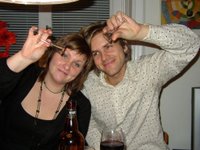 After the meal, we played a gift-giving dice game. We each had to bring a gift that was a max of 20 SEK (< $3 US). So, the gifts were, um, interesting. The gift is kind of like the white elphant game so the gifts change hands many times. One of the most sought after was "the fart book". Another gift was the "cool sunglasses".
After the meal, we played a gift-giving dice game. We each had to bring a gift that was a max of 20 SEK (< $3 US). So, the gifts were, um, interesting. The gift is kind of like the white elphant game so the gifts change hands many times. One of the most sought after was "the fart book". Another gift was the "cool sunglasses".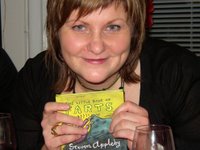
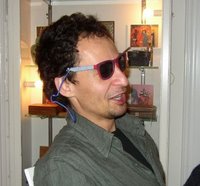 We all stuck around for a while after the dinner and gifts for some drunken conversation, some arm wrestling (I don't know how that got started!), and to sober up enough to be able to walk down several flights on a spiral staircase.
We all stuck around for a while after the dinner and gifts for some drunken conversation, some arm wrestling (I don't know how that got started!), and to sober up enough to be able to walk down several flights on a spiral staircase.